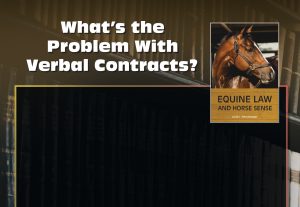What’s the Problem With Verbal Contracts?
Click here to read the complete article
 By Julie I. Fershtman, Attorney at Law
By Julie I. Fershtman, Attorney at Law
www.equinelaw.net
For decades, this author has written articles on the importance of getting equine-related agreements in writing. Some of the articles even shared common characteristics of effective contracts. Still, people in the horse industry continue doing business with nothing in writing, and disputes have occurred. This article explores what can potentially happen when verbal contract disputes become the subject of a legal battle.
Real Cases Where Verbal Contracts Failed
Over the years, verbal contract disputes have generated legal battles. Here are three examples of cases where verbal agreements failed in court challenges because of state laws:
• In a 2003 case from Maine, a verbal agreement regarding ownership, care, training and racing of thoroughbred racehorses was found to be void and unenforceable based on a state law [Maine Statute of Frauds, 33 M.R.S.A Sec. 51(5)] that required certain types of contracts to be in writing. The verbal arrangement in that case, the court found, violated the law.
• In a 2000 New York case, the court refused to enforce a verbal contract involving the boarding, breeding and care of mares and resulting foals. In doing so, the court relied on a state law [New York General Obligations Law Section 5-701] that required certain types of contracts to be in writing to be enforceable.
• In a 1972 New York case, the plaintiff was a horse buyer who claimed to have a verbal agreement to buy the defendant’s racehorse for $60,000. The seller denied an agreement existed, however, and no written contract existed. Arguing that the alleged verbal agreement should not be enforced, the seller cited a different state law [New York’s Uniform Commercial Code, Article 2-201], which required contracts for the sale of goods priced at $500 or more to be in writing. Based on the law, and taking into account circumstances of the dispute, the court ruled that no enforceable agreement existed.
Equine Industry Statutes That Can Make Contracts Important










